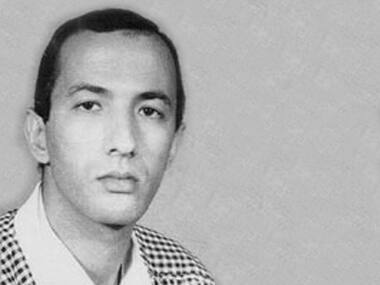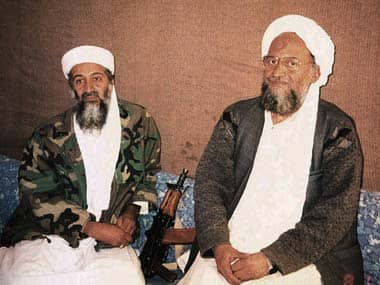The
appointment of Saif al-Adel
, a little-known Egyptian former special forces officer, as interim head of the Al Qaeda points to a ‘
war of succession
’ within the terrorist organisation following the killing of Osama bin Laden earlier this month. [caption id=“attachment_11694” align=“alignleft” width=“380” caption=“Saif al-Adel has been appointed the interim head of Al Qaeda. Reuters/HO/FBI”]
 [/caption] The succession war effectively pits regional affiliates of the increasingly amorphous Al Qaeda against the central ‘hardcoré’ leadership, says Jason Burke in The Guardian. The apparent sidelining of Ayman al-Zawahari, 59, who was bin Laden’s close associate and had for long been considered the de facto No. 2 in the Al Qaeda, could even lead to a rift,
according to media reports
. Following the appointment of al-Adel (whose name means “sword of justice”), Al-Zawahari was effectively ‘demoted’ to the role of director of international operations. Al-Zawahari, who too is from Egypt, enjoys the backing of extremists affiliated to the Al Qaeda in Yemen and Iraq. Last week, the head of the Islamic State of Iraq, an Al Qaeda-affiliate in Iraq issued a statement owing the organisation’s support for Al-Zawahari. The statement, posted on the Internet, said: “I tell our brothers in al-Qaida led by Ayman Al-Zawahiri, go on with God’s blessing and be glad that you have faithful brothers in the Islamic State of Iraq who are marching on the path of right." Al-Zawahari’s supporters are unlikely to accept the appointment of al-Adel, 48, the reports claim. Opposed 9/11 attacks Al-Adel figures in the
FBI’s Most Wanted list
of terrorists in connection with the August 1998 bombing of US embassies in two East African states. The FBI has a $5 million bounty on his head. Curiously, al-Adel is believed to have been one of three Al Qaeda operatives who opposed the 9/11 terrorist attacks in the US. [caption id=“attachment_11693” align=“alignleft” width=“380” caption=“Media reports suggest the apparent sidelining of Ayman al-Zawahari (R) who for long had been considered the de facto No. 2 in the Al Qaeda, could lead to a rift. Hamid Mir/Reuters”]
[/caption] The succession war effectively pits regional affiliates of the increasingly amorphous Al Qaeda against the central ‘hardcoré’ leadership, says Jason Burke in The Guardian. The apparent sidelining of Ayman al-Zawahari, 59, who was bin Laden’s close associate and had for long been considered the de facto No. 2 in the Al Qaeda, could even lead to a rift,
according to media reports
. Following the appointment of al-Adel (whose name means “sword of justice”), Al-Zawahari was effectively ‘demoted’ to the role of director of international operations. Al-Zawahari, who too is from Egypt, enjoys the backing of extremists affiliated to the Al Qaeda in Yemen and Iraq. Last week, the head of the Islamic State of Iraq, an Al Qaeda-affiliate in Iraq issued a statement owing the organisation’s support for Al-Zawahari. The statement, posted on the Internet, said: “I tell our brothers in al-Qaida led by Ayman Al-Zawahiri, go on with God’s blessing and be glad that you have faithful brothers in the Islamic State of Iraq who are marching on the path of right." Al-Zawahari’s supporters are unlikely to accept the appointment of al-Adel, 48, the reports claim. Opposed 9/11 attacks Al-Adel figures in the
FBI’s Most Wanted list
of terrorists in connection with the August 1998 bombing of US embassies in two East African states. The FBI has a $5 million bounty on his head. Curiously, al-Adel is believed to have been one of three Al Qaeda operatives who opposed the 9/11 terrorist attacks in the US. [caption id=“attachment_11693” align=“alignleft” width=“380” caption=“Media reports suggest the apparent sidelining of Ayman al-Zawahari (R) who for long had been considered the de facto No. 2 in the Al Qaeda, could lead to a rift. Hamid Mir/Reuters”]
 [/caption] The
9/11 Commission report
notes (on Page 251): “There is evidence that Mullah Omar initially opposed a major Al Qaeda operation directly against the United States in 2001. Furthermore, by July, with word spreading of a coming attack, a schism emerged among the senior leadership of Al Qaeda. Several senior members reportedly agreed with Mullah Omar; (among them) were weighty figures in the organisation, including Sayf al Adl.” Right after 9/11 al-Adel disappeared, and was believed to have been kept under protective house arrest near Teheran. His return to the Af-Pak battlefield in 2010 as military commander was seen as “
the biggest break Al Qaeda has had in a decade
.” His appointment now as interim head may energise jihadi elements at the core but strain relations with the affiliate organisations.
[/caption] The
9/11 Commission report
notes (on Page 251): “There is evidence that Mullah Omar initially opposed a major Al Qaeda operation directly against the United States in 2001. Furthermore, by July, with word spreading of a coming attack, a schism emerged among the senior leadership of Al Qaeda. Several senior members reportedly agreed with Mullah Omar; (among them) were weighty figures in the organisation, including Sayf al Adl.” Right after 9/11 al-Adel disappeared, and was believed to have been kept under protective house arrest near Teheran. His return to the Af-Pak battlefield in 2010 as military commander was seen as “
the biggest break Al Qaeda has had in a decade
.” His appointment now as interim head may energise jihadi elements at the core but strain relations with the affiliate organisations.
‘War of succession’ in Al Qaeda could lead to a split
FP Editors
• May 18, 2011, 15:20:10 IST
There are signs of a tussle between the hardcore central leadership of the Al Qaeda and its regional affiliates.
Advertisement
)
End of Article